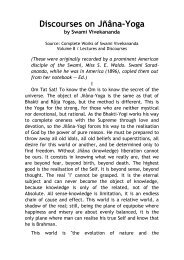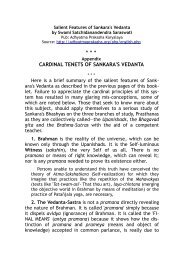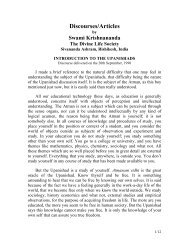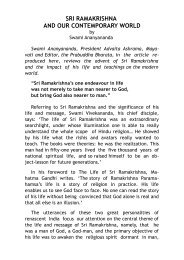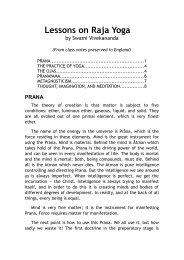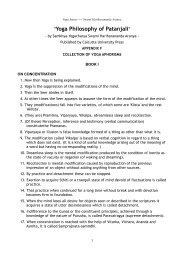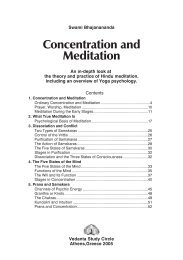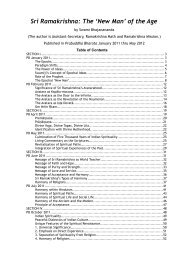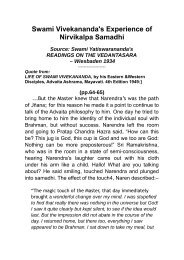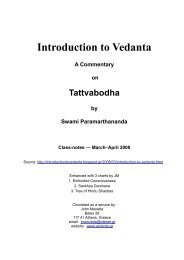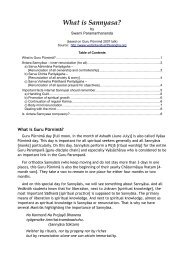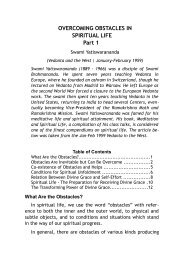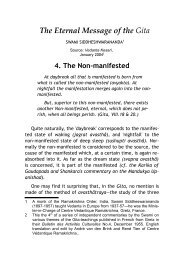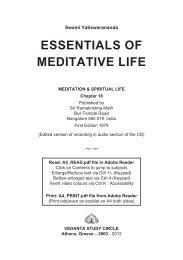The Spiritual Path - Vedanta
The Spiritual Path - Vedanta
The Spiritual Path - Vedanta
Create successful ePaper yourself
Turn your PDF publications into a flip-book with our unique Google optimized e-Paper software.
THE SPIRITUAL PATH<br />
Compiled from Letters of<br />
Swami Yatiswarananda<br />
Contents<br />
1. Preparing the Instrument ......................................5<br />
2. <strong>The</strong> Right Approach ..............................................5<br />
3. Inner and Outer Guru ............................................6<br />
4. Divine Principle ......................................................6<br />
5. Qualified Non-Dualism ..........................................7<br />
6. Monism ..................................................................7<br />
7. Bhakti .....................................................................8<br />
8. Harmony of the <strong>Path</strong>s ...........................................9<br />
9. Ramakrishna and Vivekananda ............................9<br />
10. Law of Growth .......................................................9<br />
11. Conditions for Success in Yoga ..........................10<br />
12. Work and Worship ...............................................10<br />
13. Inner and Outer Life ............................................11<br />
14. Karma ..................................................................12<br />
15. Attitude towards the World ..................................12<br />
16. Holy Association ..................................................13<br />
17. Holy Personality as Manifestation<br />
of the Divine Principle ...................................13<br />
<strong>Vedanta</strong> Study Circle<br />
Athens, Greece<br />
1994
Published by:<br />
John Manetta<br />
Beles 28 (Koukaki)<br />
GR 117 41 Athens, Greece<br />
Phone: [+30] 210 9234682<br />
email: jmanveda@otenet.gr<br />
website: www.vedanta.gr<br />
Printed in<br />
Athens, Greece<br />
November, 1994<br />
(Revised)<br />
Published to CD<br />
August 2004
PUBLISHER’S NOTE<br />
Dear Friends,<br />
We are pleased to share with you this further selection compiled from<br />
Letters of Swami Yatiswarananda.<br />
<strong>The</strong> material belongs to the Swami’s period in Europe between 1933-38<br />
and is in the original format of the carbon copies we found in India. Much of<br />
this text has been published in MEDITATION & SPIRITUAL LIFE (Published<br />
by Sri Ramakrishna Math, Bangalore) and also in THE WAY TO<br />
THE DIVINE (Published by Sarada Sevika Mandali—reprinted 1989). Anyhow,<br />
availability of the full text in the form of the present brochure facilitates<br />
the sharing of this useful spiritual resource.<br />
On internal evidence, these extracts were addressed to European students.<br />
PUBLISHER
Swami Yatiswarananda<br />
in Central Europe 1933-1940<br />
Swami Yatiswarananda (1889-1966), a senior monk and former Vice-<br />
President of the Ramakrishna Order and Mission, was a well-known spiritual<br />
figure in the Neo-<strong>Vedanta</strong> Movement. He joined the Order in 1911. Beside<br />
seven years of pioneering work in spreading <strong>Vedanta</strong> in Europe and<br />
ten years of teaching <strong>Vedanta</strong> in USA (1933-49)— he was editor of<br />
Prabuddha Bharata at Mayavati (1921-24), then he served as President of<br />
the Ramakrishna: Bombay Ashrama (1924-26), Madras Math (1926-33)<br />
and Bangalore Ashrama (1951-66). An initiated disciple of Swami Brahmananda<br />
(the great direct disciple of Sri Ramakrishna), he was widely respected<br />
for his high spiritual attainments, Yogic insight and mature wisdom.<br />
He advocated and lived a well-harmonized spiritual life with<br />
meditation as the keynote and love and service as the main melody.
THE SPIRITUAL PATH<br />
Compiled from Letters of<br />
Swami Yatiswarananda<br />
Preparing the instrument<br />
In order to do any form of spiritual practice, both the body and the<br />
mind must be made fit. Without having fulfilled this great condition, if<br />
one tries to undergo any spiritual practices in a violent manner, one<br />
cannot avoid great reactions. Even if the right thing is done by the<br />
wrong person, and in a wrong manner, troubles are unavoidable.<br />
Have plenty of physical and mental rest, giving both your body<br />
and mind as great relaxation as possible, and practice a spirit of<br />
self-surrender, to the Divine Will that lies at the back of our individual<br />
will.<br />
<strong>Spiritual</strong> aspirants should try to perfect their body and mind<br />
through the performance of the duties of life and graduated ethical<br />
culture and spiritual practice. And it is when the instruments are<br />
ready, that spiritual practice may be intensified, and not otherwise.<br />
So, without thinking too much of the goal, one should rather follow<br />
the path. <strong>The</strong> instrument of God-Vision is first to be made and perfected,<br />
and then God-Vision becomes an accomplished fact as a<br />
matter of course. When the telescope is ready, the vision of the distant<br />
stars and planets becomes an accomplished fact in no time.<br />
Intellect and feeling, and also will, can be combined by rising to<br />
the plane of the soul, and not by taking one’s stand on the intellect or<br />
on any one of the other faculties.<br />
<strong>The</strong> right approach<br />
No spiritual practice is to be done by reading of it from books. One<br />
may, of course, read books by way of getting information, but we<br />
should know which ideas to take up and which ones to leave to themselves.<br />
We may read of various practices, but we should not attempt<br />
them without knowing first of all which are good for ourselves. We<br />
may know of very many approaches and this expands our mental<br />
outlook. But we should know which is the right approach for us. During<br />
the period of experiments we should proceed slowly, noticing the<br />
physical and mental changes that take place in us and adjusting ourselves<br />
accordingly.
6 Swami Yatiswarananda<br />
<strong>The</strong> right method followed by the wrong person brings about bad<br />
results. Hence the aspirant is expected to be properly qualified, but<br />
in modern times anyone may get any book, read about some practice,<br />
follow it and also come to grief. Instructions always differ with individuals<br />
and that which is, as we say, nectar to one, may prove to be<br />
poison to another. Each one must follow the law of one’s being, and<br />
adjust oneself securely to one’s mental and physical environment. If<br />
the superstructure is built on the right foundation, it stands all right.<br />
Otherwise it tumbles down.<br />
Inner and outer Guru<br />
<strong>The</strong> real Guru, who reveals to us the Truth, is in our own heart,<br />
and he is no other than the Divine Himself. His message very often<br />
comes through some person, who also is called Guru. So the Divine<br />
is sometimes called the Guru of Gurus. We should not expect much<br />
from the outer Guru, but should try to be in tune with the inner<br />
Guru—the Divine in us—the Soul of our soul and draw knowledge<br />
and inspiration from Him. You may look upon your Ishtam [the Holy<br />
Personality appealing to you most] as the embodiment of the Guru of<br />
Gurus.<br />
Both the teacher and the pupil should try to be as much impersonal<br />
as possible. This becomes possible if the teacher tries to see<br />
the Divine in the student, and the student the Divine in the teacher.<br />
One should try to think of the other not as a person, but as the manifestation<br />
of the principle and oneself also as such. This is the beginning<br />
of practical <strong>Vedanta</strong> and then the ideal compasses<br />
everything and every being later on.<br />
Divine Principle<br />
Personality, whether of the God-man or of any ordinary individual<br />
has no reality of its own ultimately, though it has certainly got empirical<br />
reality, since we feel it. We should learn to feel the Principle also<br />
and feel It to be more real than the personality. Time has come when<br />
you should stress this point, but without in any way doing violence to<br />
yourself. Try to remember whenever you find it convenient. It does<br />
not matter if you forget it at other times. <strong>The</strong> ideal can be realized<br />
only in due course by passing through ups and downs. In the midst of<br />
the changes of life try to think of the changeless, the Ever-Present<br />
Divine in you. Like the mariner’s compass let the mind always turn<br />
towards the North Pole at all hours and places. In each personality
THE SPIRITUAL PATH 7<br />
there are two—the individual soul and the Universal Spirit.<br />
Try to be in touch with the Universal Spirit. Or, if you are in a personal<br />
mood, take the Divine with you, let your Ishtam accompany<br />
you on your journey and keep you company, protect you from all<br />
harm and bring peace to your soul, wherever you go.<br />
Qualified Non-Dualism (Visishtadvaita)<br />
Try to feel that you are a part of the Infinite and be always in touch<br />
with It. Try to recognize the same Divine Principle in all personalities—in<br />
the husband and children, in relatives, friends and strangers<br />
as well. <strong>The</strong> more you succeed in associating the Infinite, the Divine<br />
Principle, with your personality and all personalities, your emotions<br />
will be more and more sublimated and purified and you will be naturally<br />
calm, steady and wide-awake.<br />
I shall send you books that will give you the correct idea of the various<br />
ways of approach to the Divine. To begin with, it is enough if one<br />
looks upon the Divine as the Whole, and the individuals as parts.<br />
First, we have to grasp the ‘One in the many’ and then alone will<br />
come the question of the ‘One without a second’, and the central<br />
idea of real Monism.<br />
Monism (Advaita)<br />
Trust you find your talks to your Ishtam really useful. It is nice, that<br />
you are able to repeat with fervour: “He is the One Divine Being, hidden<br />
in all beings”. If you feel embarrassed to repeat: “I am the Light<br />
of the Self”,—then drop it for the present. Otherwise you may continue<br />
to repeat such passages along with the previous ones. It is<br />
good to stress unity a bit.<br />
<strong>The</strong> bubble is not the ocean, not even the wave. It is the substance<br />
of the bubble,—water— that is one with the ocean, that is the<br />
same as the ocean. We can take the monistic standpoint only when<br />
we can think of the Spirit as distinct from the form. When we cannot<br />
do that, we may think only of the Immanent aspect. Meditations on<br />
the Immanent prepare us for approaching the One without a second.<br />
You need not give any thoughts to psychic experiences at all.<br />
Through the unfoldment of higher consciousness you would have<br />
more and more of the experience of the Infinite Presence in your soul<br />
and then you would feel also the same presence in others as well. To<br />
the extent that we become pure in thought, word and deed, we come<br />
to have this realization.
8 Swami Yatiswarananda<br />
When on page 187 of the Inspired Talks 1 , the Swami says, “Your<br />
own will is all that answers prayers”—he is speaking from the monistic<br />
standpoint. <strong>The</strong> monist, giving up all the limitations of his personality<br />
and identifying himself with the Infinite, sees every being as the<br />
manifestation of the Self, and the ‘I’, the Infinite Consciousness.<br />
It is not the ‘little you’, but the ‘big you’ that answers the prayers.<br />
<strong>The</strong> microcosm and the macrocosm are not different. So God and<br />
the devotee are not separate. God in one form is the worshipped,<br />
and He again in another form is the devotee. He, as the devotee,<br />
prays, and again He, as the worshipped, responds.<br />
On the relative plane we feel we are different from God. <strong>The</strong><br />
prayer rises from our little soul, but the response comes from God,<br />
from our higher Self, and not from our lower self.<br />
Bhakti<br />
But as long as we are on the relative plane and are conscious of<br />
our limited existence and think of ourselves as personalities, our personality<br />
is real to us and as such we should worship and pray to the<br />
Divine—our higher Self. Really there is no conflict or contradiction,<br />
as the standpoints are different.<br />
You should not worry about the Monist’s attitude. Yours should be<br />
the attitude of the devotee. To you, religion is, as Swami Vivekananda<br />
in one of his lectures says, “<strong>The</strong> eternal relation between the<br />
eternal soul and the eternal God. Of the highest ideal of devotion he<br />
speaks on page 58 2 of the Inspired Talks. [Day and night think of<br />
God and think of nothing else as far as possible. <strong>The</strong> daily necessary<br />
thoughts can all be thought through God].” Again he says on page<br />
177 3 —“Giving up the desire of pleasure and pain, gain or loss, worship<br />
God day and night.” But as I told you and also wrote to you, the<br />
aspirant should proceed slowly and steadily. Before one can begin to<br />
run, one must learn to walk. Body and mind are to be properly trained<br />
through the performance of the duties of one’s life, through moral<br />
culture, prayer and meditation at fixed hours. And then only is it possible<br />
for the devotee to worship God day and night through all forms<br />
of activities, physical and mental.<br />
1. Friday, August 2 (para.10).<br />
2. Monday, June 24 (para.14).<br />
3. Wednsday, July 31 (last para).
THE SPIRITUAL PATH 9<br />
With our sense of individuality which is real to us now, we should<br />
try to pray to the Divine and worship Him as well as we can. And the<br />
response comes from the Divine, our higher Self or God, who manifests<br />
Himself as Buddha, Christ or Ramakrishna.<br />
Harmony of the <strong>Path</strong>s<br />
Jñana and Bhakti are to be blended, but different individuals may<br />
have these in different proportions.<br />
You will have both Jñana and Bhakti combined—a harmony of the<br />
paths of knowledge and devotion, as you have both the elements in<br />
your nature. Your Bhakti is to be tempered with Jñana.<br />
Ramakrishna and Vivekananda<br />
Ramakrishna is the silent cloud and Vivekananda is the thundering<br />
cloud. One represents the static aspect and the other the dynamic<br />
aspect of the same spiritual power. <strong>The</strong> Gospel of Sri Ramakrishna<br />
stressed Bhakti too much, but this stress is necessary for<br />
most people. You get an idea of the Jñana aspect of Ramakrishna in<br />
the second chapter of section 2 of the Gospel of Sri Ramakrishna<br />
Vol.I. 4<br />
Law of growth<br />
Life consists of a series of rises and falls,—one should not get too<br />
much elated during the rise, nor too much depressed during the fall.<br />
And at all hours one should try to be in touch with the Divine within<br />
and outside. In this lies the secret of the ‘balanced state’, and also of<br />
progress towards the Goal.<br />
Again, it is not enough if we have the highest ideal before us. We<br />
must also know that as we cannot reach it all of a sudden, we should<br />
have ideals that serve as stepping-stones leading towards it. This<br />
holds good as regards moral culture and spiritual practice. We have<br />
to pass through the lower regions if we want to attain to the summit.<br />
This is a point we should never lose sight of.<br />
Since spiritual growth is a slow transformation, no great results<br />
can be expected until we follow the path patiently for some good<br />
time. By trying to do too much in a fit of enthusiasm, we can only do<br />
harm to ourselves and retard our progress. We should never try to<br />
4. Currently available as <strong>The</strong> Condensed Gospel of Sri Ramakrishna, published<br />
from Sri Ramakrishna Math, Chennai. See page 61: <strong>The</strong> Master on Jñana Yoga etc.
10 Swami Yatiswarananda<br />
imitate Ramakrishna in this respect. He could afford to have a tremendous<br />
yearning and undergo super-human disciplines as his<br />
body and mind were exceptionally fit for spiritual strivings.<br />
Conditions for success in Yoga<br />
<strong>The</strong> aspirant should always bear in mind these passages of the<br />
Bhagavad-Gita, which Sri Ramakrishna as well would have said:<br />
Success in Yoga—spiritual practice—is not for him who<br />
eats too much or too little, for him who sleeps too much or<br />
too little. To him who is temperate in eating and recreation,<br />
in his effort for work, and in sleep and wakefulness, Yoga<br />
becomes the destroyer of misery.<br />
Work and worship<br />
At first there is a difference between work and worship. Later,<br />
work too becomes worship, and the whole life becomes one of undivided<br />
consecration.<br />
Work and worship must go hand in hand. Both of these affect the<br />
purification of our mind and help us in the unfoldment of the higher<br />
consciousness in us, and so they are to be looked upon as twofold<br />
forms of spiritual practice. At first we should try to make our activity<br />
as much selfless as possible, offering the fruits of our work to the Divine.<br />
Later on, we learn to work as instruments in the hands of the Divine.<br />
Learn to work maintaining something of the meditative<br />
mood,—that inner balance and poise that comes to one after a good<br />
meditation.<br />
Inner and outer life<br />
<strong>The</strong>re should be as good a co-ordination as possible between the<br />
intellect, feeling and will. Further, there should be a balance between<br />
the outer life and the inner life, between our active life and<br />
thought-life. A balance between the inner and outer life is to be attained<br />
by everybody, maybe in different proportions.<br />
You have to be true to the ‘kindred points of heaven and home’,<br />
without trying to soar too high and without attempting to avoid facing<br />
the realities of life, even if they are unpleasant.<br />
Try to be in tune with the Indwelling Spirit—the real Guru—and be<br />
inspired and directed by Him in this play of life.<br />
It is hard for the rich—for those who think they are rich—to enter<br />
the Kingdom of Heaven. Those who have wealth may replace the
THE SPIRITUAL PATH 11<br />
sense of ownership by that of trusteeship. Inner renunciation is more<br />
important than mere outer renunciation.<br />
As Swami Vivekananda says: “True knowledge [Jñana] teaches<br />
that the world should be renounced, but not on that account abandoned.<br />
To live in the world and be out of it, is the truest renunciation.”<br />
Most people suffer because of the discrepancy between the spiritual<br />
aspiration and the grim reality one has to face in the worldly life.<br />
This suffering by itself is not an evil. It may be even for one’s good, if<br />
it acts as an incentive for finding an inner adjustment by means of<br />
which one may gradually feel that one is not really of the world, even<br />
if one has to live in the world.<br />
In a sense, we all get what we deserve. We wish for a thing, we<br />
get it, and along with it also the good and evil inseparably follow it.<br />
We seek some forms of happiness and then, as Swami Vivekananda<br />
says, “<strong>The</strong> happiness comes putting on the crown of misery.” We<br />
cannot accept the one without the other also.<br />
We wish for the satisfaction of some worldly desire. We may get<br />
the object of desire, but also the troubles associated with it. Our<br />
present state is the result of our past worldly desires—and of our<br />
present desires. Let us learn to be as desireless as possible, to adjust<br />
ourselves to the circumstances that we ourselves have brought<br />
about, and then rise above them. Let us work out our destiny and<br />
learn to depend on the Divine more and more as we work out our<br />
Karma. <strong>The</strong>n the world becomes a training ground. Through it we<br />
pass on to the Divine. Even then we may be content to remain in the<br />
world outwardly. But really speaking we are no more of it. We are the<br />
Lord’s wherever we be.<br />
Karma<br />
Certain forms of Karma are to be worked out through suffering.<br />
We should feel somewhat relieved that suffering implies so much<br />
less of the burden of Karma. Besides, the helplessness brought<br />
about by suffering may be utilized spiritually by practicing self-surrender<br />
to the Divine all the more. In pain and pleasure, in life and in<br />
death—the Lord is our own. He is the Soul of our soul, the Life of our<br />
life.<br />
Sri Ramakrishna used to say that diseases are the taxes we have<br />
to pay for living in the house of the body. We have to pay these taxes<br />
sometimes in good installments. And then for some time there may
12 Swami Yatiswarananda<br />
be a respite. <strong>The</strong> Master was often heard to say during his great illness:<br />
“Let the body feel the pain, O my mind, do Thou remain in<br />
bliss,”.<br />
Move onwards without trying to run too much. We have got to<br />
work out the Karma that has begun to bear fruit already. If we try to<br />
escape it, we have to pay for it with compound interest. God-realization<br />
is certainly the Goal, but this can be reached not merely through<br />
spiritual culture, but also through proper working out of the Karma<br />
we have in store. We must know what is proper and necessary or improper<br />
and unnecessary. Hence we should be careful both about the<br />
inner ideal and outside action. Proceed slowly and steadily, exhausting<br />
your Karma, being in tune with the Divine within and also careful<br />
about what you do. We must correct ourselves always, both on the<br />
thought-plane and also on the plane of action.<br />
Attitude towards the world<br />
Very often we expect too much from others and when we cannot<br />
get it, we feel disappointed. What can poor men do We have a saying<br />
in Sanskrit—“Having drunk of the wine of ignorance, the whole<br />
world has become mad.” So the mad world will and can behave only<br />
in a mad way. But it is a greater madness on our part to expect the<br />
mad to act in a sane way. Instead of getting angry, we should be<br />
sympathetic towards those who do not know what they do and cannot<br />
control themselves out of helplessness, even if they know it.<br />
Holy association<br />
Sometimes in the course of our spiritual progress we are likely to<br />
develop a sort of unhealthy introversion. This is to be avoided among<br />
other things by going in for holy association. I mean by coming in<br />
close contact with spiritually-minded persons, following more or less<br />
the same path and comparing notes with them.<br />
Our individual consciousness is to be brought in touch with the Infinite<br />
Divine Consciousness. This is the surest way of resolving the<br />
whirlpool in our mind. When Divine contact is hard to achieve, the<br />
company of spiritual souls and holy talks with them help us a good<br />
deal. Some day all the devotees in Switzerland should know {, those<br />
with morbid extroversion seek others’ company just for gossiping<br />
and killing their time. <strong>The</strong> true devotees maintain a balance between<br />
inner and outer life, and seek the company of the spiritually-minded,<br />
discuss spiritual matters and strengthen their faith by learning from
THE SPIRITUAL PATH 13<br />
one another. That is why Sri Ramakrishna used to advocate the<br />
meeting of devotees, as you find in the Gospel of Sri Ramakrishna.<br />
If one can be in tune with the Divine always, no holy company may<br />
be necessary. Otherwise, association with fellow-aspirants is very,<br />
very necessary for spiritual progress.<br />
Holy Personality as Manifestation of the Divine Principle<br />
Try to have contact with the Indwelling Spirit in you. He is the Soul<br />
of our souls and the Real Guru. When you feel the need of holy company,<br />
please think of the Lord, and also repeat His name if you so<br />
wish. He is the Power behind us all, and without Him we all are nothing.<br />
When you come to think of anyone in a personal way and feel it<br />
to be so, call up the thought of your Ishtam and merge all thoughts<br />
about the person into Him, his form into His form. And in and through<br />
Him may you realize the formless also. We all meet in Him who manifests<br />
Himself as the Holy Personality and Power and also as all ordinary<br />
personalities.<br />
<strong>The</strong> Universal Principle in His Infinite mercy and compassion<br />
manifested Himself as different Holy Personalities,—but all ultimately<br />
come to reach and meet in the same Principle—our common<br />
Background.<br />
As long as you do not find anyone to talk with about things spiritual,<br />
learn to talk with the Lord. It will be a source of great blessing to<br />
you, you will see. May He always inspire and guide you. I wish you to<br />
come in more and more touch with the Personal-Impersonal aspect<br />
of your Ishtam, and be more and more impersonal looking upon<br />
yourself, more in terms of the Atman —the Spirit—than in terms of<br />
the body and the mind. You may read every day a few meditations<br />
like this: “I am neither mind nor intellect, neither memory,” etc. etc.<br />
You may pray to the Great Personality who appeals to you, looking<br />
upon the Personality as the manifestation of the Divine Principle.<br />
You may also take His name, if you want to, when you pray for inspiration<br />
and guidance. <strong>The</strong> more you advance, you will feel Him to be<br />
the Indwelling Spirit, the Soul of our souls—the Soul of all that exists.<br />
He is, as it were, the channel through which you approach the Divine<br />
Principle—the Infinite and the All-Pervading.<br />
End of<br />
THE SPIRITUAL PATH<br />
Compiled from Letters of Swami Yatiswarananda



